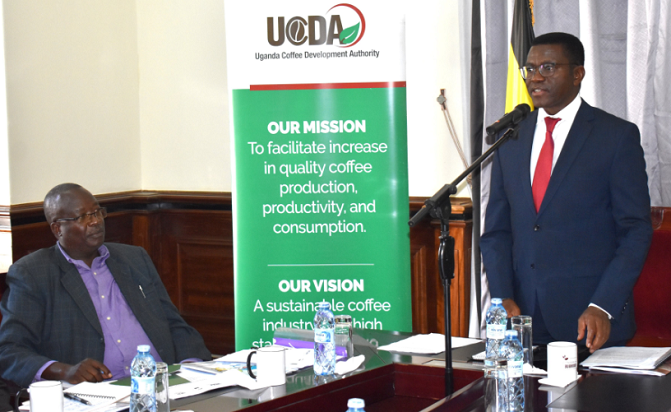Katikkiro Charles Peter Mayiga talking to coffee stakeholders at Bulange, Mengo on Friday.
The Katikkiro of the Buganda Kingdom, Charles Peter Mayiga, has called on coffee growers across the country to allow Government officials/representatives register them as Uganda races to meet the European Union Regulation on Deforestation-free products (EUDR) requirements.
The government, through the Uganda Coffee Development Authority (UCDA), is in the final stages of registering coffee farmers.
On December 5, 2024, the EU Parliament approved a new regulation, EUDR, to ensure that the supply chains remain free from products that cause deforestation. The EUDR entered into force on June 29, 2023, and will enter into application on December 30, 2024. The regulation seeks to ensure that oil palm, soy, wood, cocoa, coffee cattle, rubber, and their associated products, imported, exported, and/or traded within the EU, are not associated with deforestation and forest degradation. In the last 10 years, Uganda exports to the 26 EU countries have averaged 63%.
As part of collaboration, a team from the Uganda Coffee Development Authority (UCDA) met the Katikkiro at Bulange, Mengo on Friday to brief him on the impending registration of coffee farmers.
Dr. Gerald Kyalo, the Director of Development Services at the UCDA, made a case for the registration of coffee farmers, saying that the EUDR has a direct impact on Uganda’s coffee trade with European countries.
Under this regulation, Dr. Kyalo said that seven agricultural commodities imported into the EU, including coffee and cocoa, must be sourced from land that was not deforested after December 2020. Article 3 of EUDR requires that exporters of commodities such as coffee, cocoa, and their derivatives to submit specific documents to export to the EU market. These include detailed land use maps to confirm deforestation-free production after December 2020, compliance with local legislation in production, and a due diligence statement covering the entire coffee supply chain indicating no more than a negligible risk of non-compliance.
Dr. Kyalo said that the sector is currently in the final stages of rolling out a country-wide coffee value chain registration exercise, which will form the basis for coffee traceability. This, he said, will require the registration of all coffee plots across the country.
“Enumerators will visit all coffee farms, recording the minimum set of data required for EUDR compliance verification, including geo-locations of coffee plots. To ensure the success of the registration exercise, we need the full cooperation of industry players and cultural, religious, administrative, and political leaders. This will help address any suspicion or resistance among the coffee farming and trading constituency. It is also crucial that any expansion of coffee cultivation is done in compliance with the EUDR, ensuring that new plantations are not established by cutting down natural or plantation forests,” said Dr. Kyalo.
During his presentation, Dr. Kyalo requested the Kingdom’s support and endorsement as the country undertakes the activities on value chain registration to ensure traceability of “our coffee such that our coffee is compliant and can continue accessing the EU market.”
After listening to a presentation from Dr. Kyalo, Katikkiro Mayiga, said, “It is our duty to join hands with everyone involved in the coffee sub sector so as to protect those whose lives depend on coffee.”
“We are going to join hands with the government to ensure that coffee is not grown on deforested land. It is our duty to sensitize coffee farmers about registration,” added Mayiga.
However, he noted that for the Kingdom to help, it is important that the parties involved collaborate. “It is important for us to collaborate with the government and UCDA so that people understand that this registration is for their own good,” he said. “And I think we will need significant support to meet the registration deadline before the year ends.”
The Katikkiro also rallied the UCDA on correct messaging.
“We have to inform the farmers that this is not targeting them but about anything grown on land and exported to Europe. That if the EU market is blocked, prices will fall. The standard of living will drop, yet farmers have been able to afford decent accommodations, pay school fees, and get medical treatment because of coffee,” he said.





